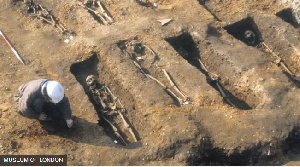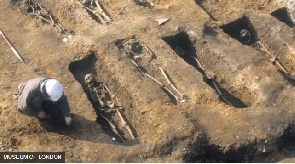News Africa
Black Death 700 years ago dey affect your health now

Di devastation of di plague pandemic don leave ogbonge genetic mark on humanity sotey e still dey affect our health nearly 700 years later.
Up to half of pipo die wen di Black Death sweep through Europe for di mid-1300s.
One first study wey analyse di DNA of centuries-old skeletons find mutations wey help pipo survive di plague.
But those same mutations dey linked to auto-immune diseases wey dey afflict pipo today.
Di Black Death na one of di most significant, deadliest and bleakest moments for human history.
Dem even estimate say up to 200 million pipo die.
Researchers suspect say event much like dis must to don shape human evolution.
Dem analyse say DNA wey dem take from di teeth of 206 ancient skeletons, dey able to fit give di date of di human remains to before, during or afta di Black Death.
Di analysis include bones from di East Smithfield plague pit wey dem use for for mass burials inside London with more samples coming from Denmark.
Di standout finding, wey dem publish for di journal Nature, surround mutations for one gene wey dem call ERAP2.
If you get di right mutations you dey 40% more likely to survive di plague.
“Dat dey huge, na huge effect, e dey surprising to find something like dat for di human genome,” Professor Luis Barreiro, from di University of Chicago, tok.
Di gene job na to make di proteins wey chop up invading microbes and show di fragments to di immune system, making am dey more effective to recognise and neutralise di enemy.
Di gene dey come in different versions – those wey dey work well and those wey dey do nothing – and you get a copy from each parent.
So di lucky ones, wey dey most likely to survive, inherite high-functioning version from mum and dad.
And di survivors get children and so pass those helpful mutations on so dem go suddenly become much more common.
“E dey huge. We see 10% shift over two to three generations, na di strongest selection event for humans to date,” evolutionary geneticist Professor Hendrik Poinar, from McMaster University, tok.
Di results dey confirm for modern day experiments using di plague bacterium – Yersinia pestis.
Samples of blood from pipo with di helpful mutations dey more able to resist di infection than those without.
“E dey like watching di Black Death dey open up for dish – e dey eye-opening,” Prof Poinar tok.
Even today those plague-resisting mutations dey more common than dem dey before di Black Death.
Di problem be say dem dey linked to auto-immune diseases like di inflammatory bowel disease Crohn – wey help to keep your ancestors alive 700 years ago but fit dey damage your health today.
Oda historic forces on our DNA get legacy wey we dey feel.
Around 1-4% of modern human DNA dey come from our ancestors mating with Neanderthals and dis inheritance affects our ability to respond to diseases including Covid.
“So those scars from di past still dey impact our resistance to disease today, for very remarkable way,” Prof Barreiro tok.
Prof Barreiro say di 40% survival advantage na di “strongest selective fitness effect wey dem don ever estimate for humans”.
E be like say e dwarfs di benefit of HIV-resistance mutations or those wey dey help digest milk – although e warns direct comparisons dey tricky.
Di Covid pandemic no go leave similar legacy though.
Evolution works through your ability to reproduce and pass on your genes.
Covid largely kill di elderly wey don already pass di point of having children.
CLICK HERE TO DOWNLOAD PRESS RADIO MOBILE APP
Na plague ability to kill across di age spectrum and for such great numbers wey meant say e get such lasting impact.
Source: www.bbc.com
-

 Lifestyle3 weeks ago
Lifestyle3 weeks agoRoad Safety Authority narrates how buttocks causes road accident
-

 GENERAL NEWS4 weeks ago
GENERAL NEWS4 weeks agoWhy 15 police officers stormed Owusu Bempah’s church – Kumchacha narrates
-

 GENERAL NEWS3 weeks ago
GENERAL NEWS3 weeks agoWatch how Ibrahim Mahama rode Honda superbike to pay last respects to late friend
-

 GENERAL NEWS4 weeks ago
GENERAL NEWS4 weeks agoHow Offinso residents storm destooled queen mother’s house, demand for new chief
-

 South Africa News4 weeks ago
South Africa News4 weeks agoWoman thrown out of a speeding taxi while on her way to work
-

 GENERAL NEWS3 days ago
GENERAL NEWS3 days agoDeadly clash between youth and navy personnel results in two deaths at Tema Manhean
-

 SHOWBIZ KONKONSAH5 days ago
SHOWBIZ KONKONSAH5 days agoJunior Pope’s Death: Video of John Dumelo refusing to join canoe for movie shoot over safety concerns resurfaces
-

 News Africa1 month ago
News Africa1 month ago‘Satanically dubious’ – SCOAN releases statement on BBC’s report about TB Joshua, church














